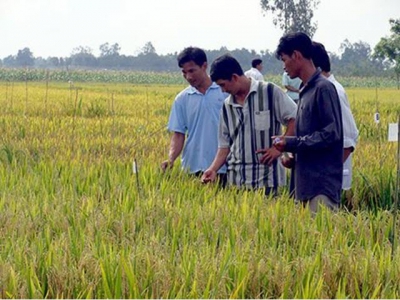Hau Giang, RoK organisation continue hi-tech farming cooperation

Illustrative photo (Source: baohaugiang)
Hau Giang (VNA) – The Mekong Delta province of Hau Giang will continue working with the Republic of Korea (RoK)’s organisation for agricultural technology transfer and trade (FACT) in forming agricultural production value chains, stated a local official.
Truong Canh Tuyen, Vice Chairman of the provincial People’s Committee made the statement at a working session with FACT representatives and some Korean businessmen on October 25. The session discussed projects implemented at the Hau Giang high-tech farming park.
Highlighting experience exchange and win-win cooperation between Hau Giang, FACT and involved businesses, Tuyen expected the sides to start production chains following their successful tests in 2017 and 2018.
In late May this year, FACT signed an agreement with Hau Giang to increase the use of biological products of the RoK for growing pineapple, pomelo and mango. Accordingly, the organisation will provide 17,000 USD worth of 20 biological products to the locality.
In 2017, FACT ran a cooperation project with a village in the local Vinh Vien commune, Long My district, under which it supplied 13 biological products and some technological equipment for rice cultivation in two crops on an area of 14 hectares at a cost of 9,000 USD.
From October 25 to 27, three RoK companies are scheduled to run demonstrations of three machines for land levelling, automatic pesticide spraying, and fruit sorting based on weight.
On October 29 and 30, seven RoK companies will come to Hau Giang to visit a number of sites showcasing local products, looking for partnership opportunities in building value chains for key plants of the province.
Có thể bạn quan tâm
 Israel to introduce agro & water technologies and culture in Hanoi
Israel to introduce agro & water technologies and culture in Hanoi Advanced technologies in agriculture will be showcased in center of capital this weekend.
 Ly Son garlic falsification results in large unsold volume
Ly Son garlic falsification results in large unsold volume Some traders have currently transported garlic from other places to Ly Son island district, Quang Ngai province and masqueraded local product, causing price
 Minnesota finds H5N2 low-path avian flu in commercial turkey flock
Minnesota finds H5N2 low-path avian flu in commercial turkey flock Strain is not same virus that caused 2015 outbreak and does not pose risk to public health or food safety.